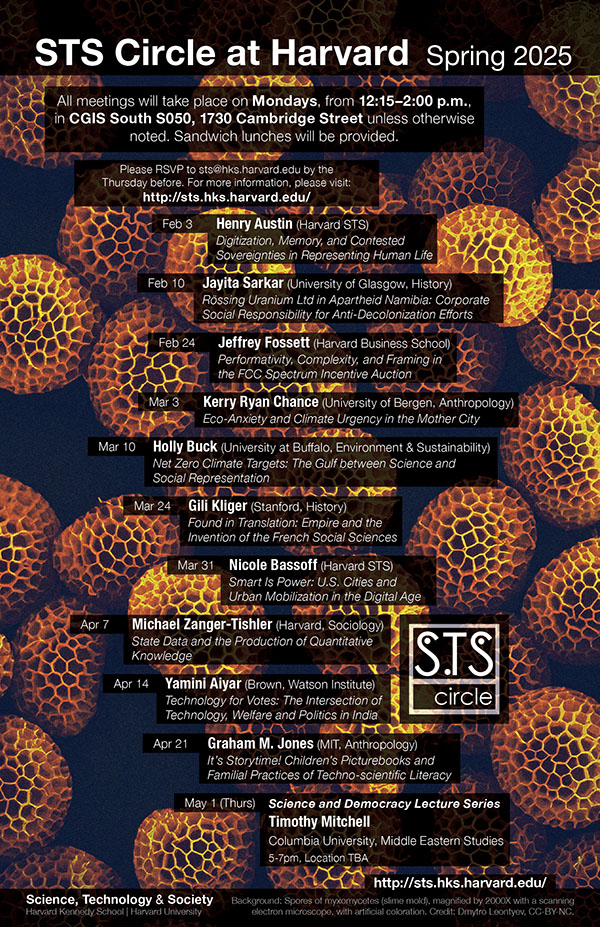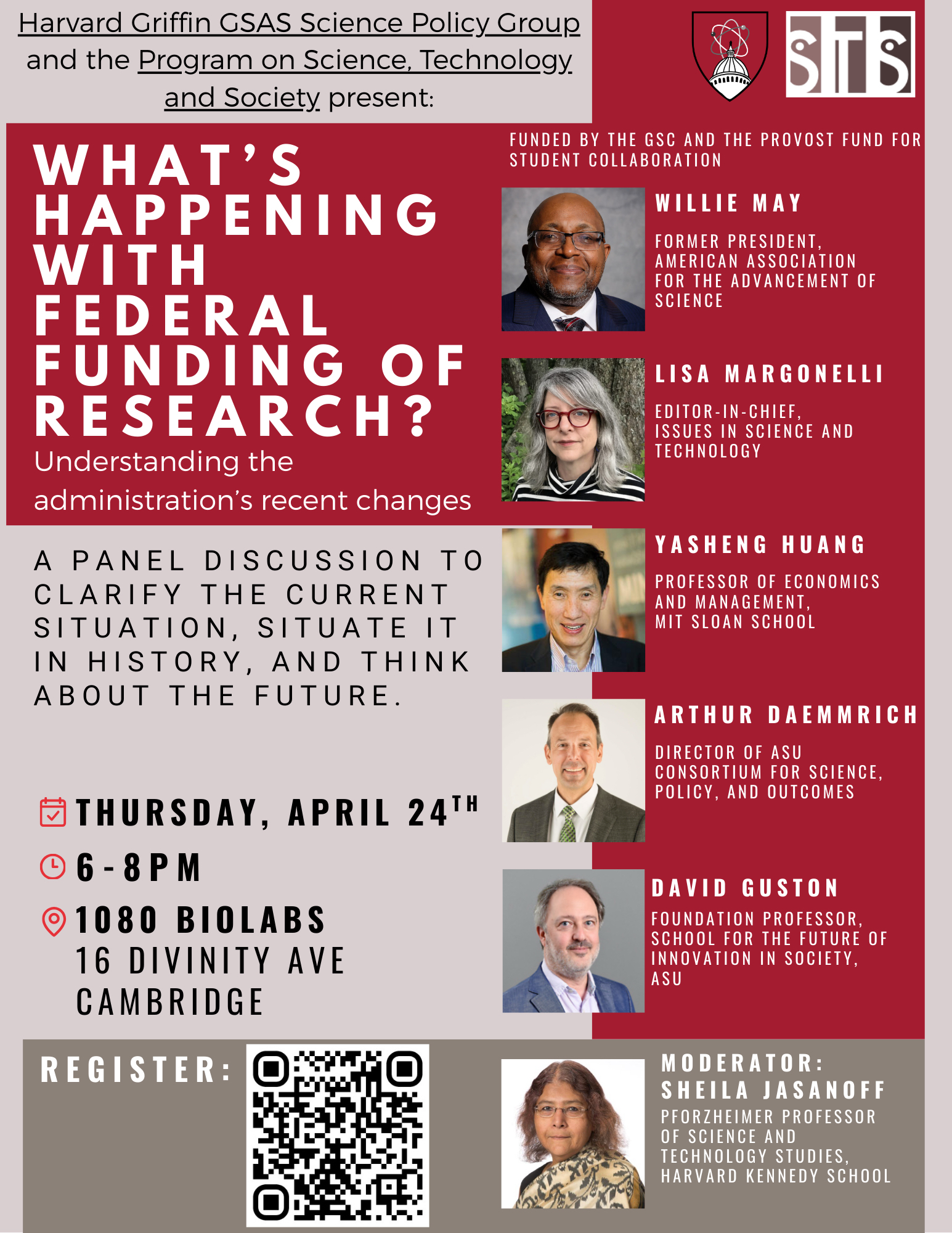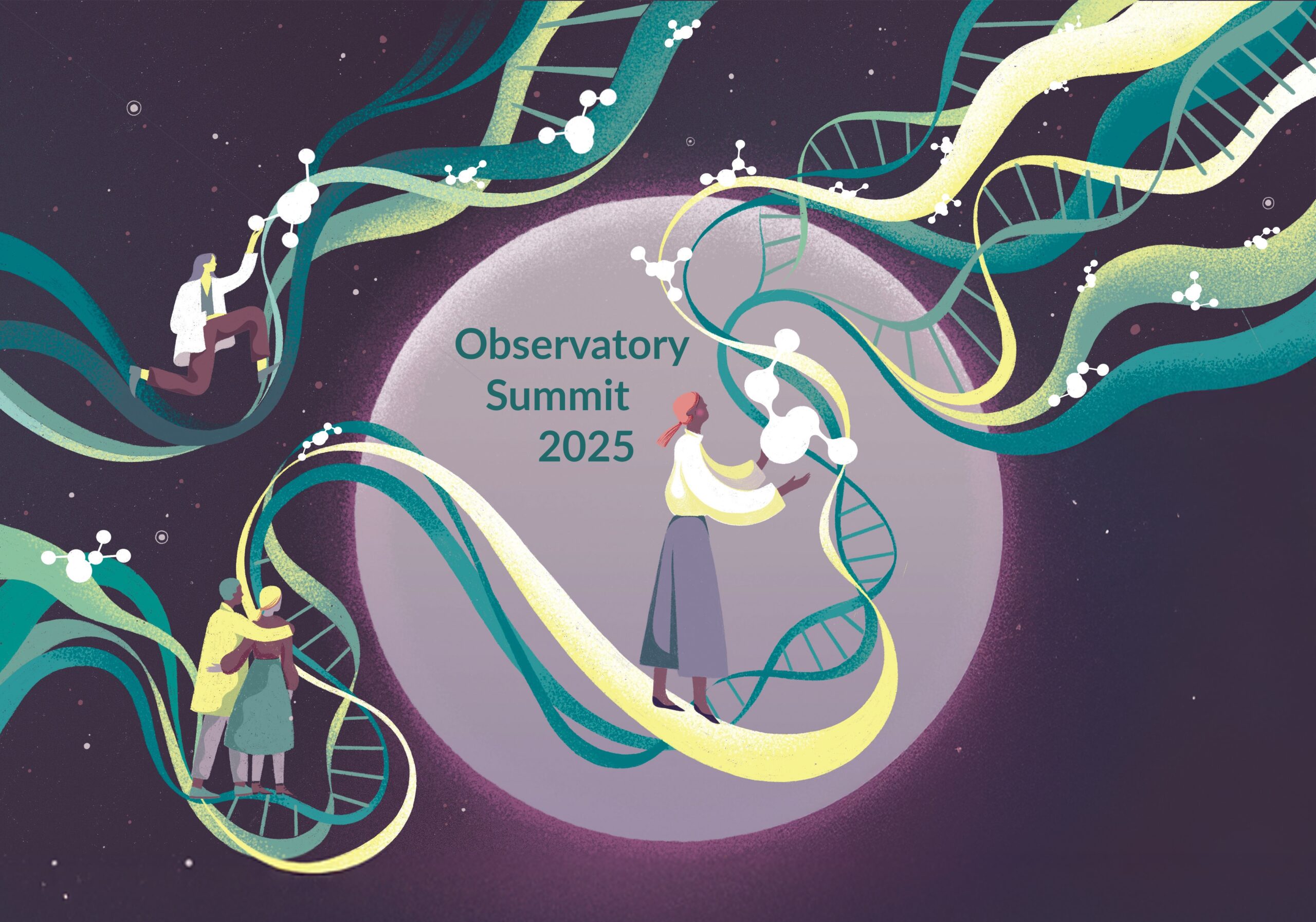Program on Science, Technology and Society at HarvardHarvard Kennedy School of Government | Harvard University |
|||||||
|
|
EventsSTS CircleThe STS Circle at Harvard meets weekly during the academic semester. For Spring 2025, all meetings are planned to take place in person on Mondays, from 12:15-2:00 p.m., in CGIS South S050, 1730 Cambridge Street unless otherwise noted. Sandwich lunches will be provided. To receive the abstract and bio for each talk, and to register to attend, please join our mailing list. Spring 2025Feb. 3: Henry Austin (Harvard Kennedy School, Global Observatory on Genome Editing)
Digitization, Memory, and Contested Sovereignties in Representing Human Life Feb. 10: Jayita Sarkar (University of Glasgow, History)
Rössing Uranium Limited in Apartheid Namibia: Corporate Social Responsibility for Anti-Decolonization Efforts Feb. 24: Jeffrey Fossett (Harvard Business School)
Performativity, Complexity, and Framing in the FCC Spectrum Incentive Auction Mar. 3: Kerry Ryan Chance (University of Bergen, Norway, Anthropology)
Eco-Anxiety and Climate Urgency in the Mother City Mar. 10: Holly Buck (University at Buffalo, Environment & Sustainability; 2024-2025 Harvard Radcliffe-Salata Climate Justice Fellow)
Net Zero Climate Targets: The Gulf between Science and Social Representation Mar. 24: Gili Kliger (Stanford University, History)
Found in Translation: Empire and the Invention of the French Social Sciences Mar. 31: Nicole Bassoff (Harvard Kennedy School)
Smart is Power: U.S. Cities and Urban Mobilization in the Digital Age Apr. 7: Michael Zanger-Tishler (Harvard University, Sociology & Social Policy)
State Data and the Production of Quantitative Knowledge Apr. 14: Yamini Aiyar (Brown University, Watson Institute)
Technology for Votes: The Intersection of Technology, Welfare and Politics in India Apr. 21: Graham Jones (MIT, Anthropology) It's Storytime! Children’s Picturebooks and Familial Practices of Techno-scientific Literacy » More information and past schedules Science & Democracy Lecture SeriesOnce a semester, the STS Program, with co-sponsorship from other local institutions, hosts an installation in its Science and Democracy Lecture Series.
The Harvard Griffin GSAS Science Policy Group and the Science, Technology and Society program present "What's happening with federal funding of research? Understanding the administration's recent changes." In the past two months, longstanding practices and assumptions underlying the organization of academic research have faced fundamental challenges. From indirect cost rates, to federal grant review processes, conventional mechanisms for sponsoring scientific research are no longer taken for granted, creating uncertainties for universities and disruptions in hiring, research projects, and graduate training. Since the end of WWII, science and technology have been constitutional to our understanding and advancement of American society, and while state sponsorship of science has been renegotiated in the past, such a radical realignment between state and science is unprecedented. If knowledge production is to be defended as a public good, now is the moment to re-familiarize ourselves with the US research enterprise, its mechanisms, contributions, accountability, and positioning vis-à-vis broader society. Workshops and Panels
The Global Observatory’s 2025 Summit foregrounds questions about biotechnologies that are altering the meaning of being human. Genome editing, especially of the human germline, raises fundamental questions of the dignity and integrity of human life. Governance concerns once focused on the escape of potentially risky lab-created organisms. Today the more urgent concerns relate to transgressing moral boundaries and violating human integrity. How should we respond? » Workshops and panels archive Program newsApplications for the 2025-2026 STS Undergraduate Fellowship are due Sunday, June 29. Congratulations to our extraordinary STS Fellows Nicole West Bassoff and Hilton Simmet, the first graduates to hold a PhD in Public Policy on the Science, Technology and Policy Studies track! Two STS Undergraduate Fellows received a Hoopes Prize for their senior theses — Katie Burstein with “The Body Restored: Constructions of the Patient in the Cult of Asclepius,” and Emil Massad with “We Never Said You Weren’t Exposed: Risk in the Aftermath of the Train Derailment in East Palestine, Ohio.” Join us for the Global Observatory for Genome Editing International Summit on May 21-23. Register and learn more here. Register here for a panel discussion on April 24 regarding recent changes to federal research funding, co-hosted with the Harvard Griffin GSAS Science Policy Group. The 2025 STS Undergraduate Essay Prize contest is now open. Submissions are due here by April 14, 2025. The 2025-2026 STS Fellows application is now OPEN. Application deadline has been extended to March 14, 2025. Register to attend the launch symposium on October 25 for the McQuillan Institute for Science, Technology and the Human Future. Sheila Jasanoff was honored with the Phi Beta Kappa Alpha Iota Excellence in Teaching prize. Congratulations to the winner of the STS Undergraduate Essay Prize, Andrew Charroux, and to the honorable mentions, Joshua Fang and Maya Rosen! Watch videos here to learn more about their winning papers. |
||||||


